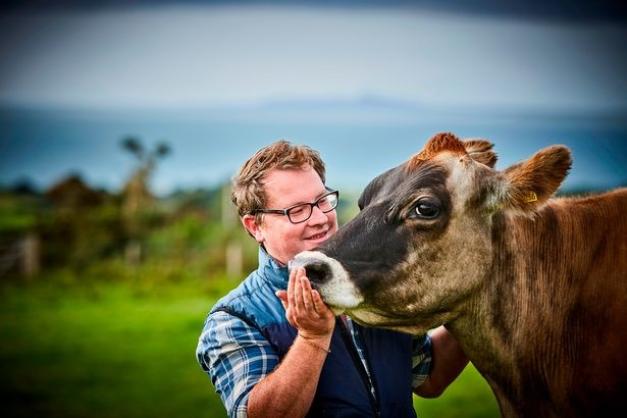
The vegetables are grown by former television producer Dr Matt Swarbrick and his wife, Jenny, and delivered weekly in boxes to 80 or so homes, to recipients who are members of a community supported agriculture (CSA)-style initiative.
It all started in 2018, after Matt was awarded funding from the Farming Connect Management Exchange Programme to visit small-scale farms in Europe who have embraced permaculture to produce food.
He was already growing vegetables at Henbant Farm, near Caernarfon, for his own family and friends but this visit inspired him to scale-up.
“The Farming Connect Management Exchange Programme really changed the game in what we were doing, it gave us the confidence to jump in with both boots,’’ says Matt.
As a new entrant with no family background in farming, he admits there was a lot he needed to learn about horticulture, and that’s where Farming Connect was able to again step in.
“Farming Connect staff were very helpful in signposting us to the appropriate services.
“Having events at the farm, as a Farming Connect focus site, also gave us the benefit of discussing different business models and ways of doing things with other growers.
“Having that suite of learning really helped to inform what we were doing because, although we could have found some stuff in books or videos, there is so much that is not shared in that way that you wouldn’t know unless you are born into farming.’’
The outcome was a vegetable box scheme, which Matt says is “loosely based’’ around the CSA model.
Every Thursday at first light, he can be found harvesting the vegetables, which are delivered within hours to local homes, creating a resilient and secure local food system with a short and simple supply chain.
“We started with a bigger radius of customers but as demand has got bigger closer to home, we have been able to make it more local, cutting down further on food miles,’’ Matt explains.
The box scheme is one of a range of regenerative enterprises at Henbant, others include pastured poultry and agroforestry, and is one that Matt finds very rewarding.
“We asked ourselves at the outset what is the most useful thing you can do with land that is good for your community and it had to be growing good organic vegetables, it is a no-brainer, it’s what lots of other farmers should be doing.’’
Having a “positive relationship’’ with Farming Connect has been enormously helpful, he adds. “It somehow gives even more credence to what we are doing.’’
As well as taking advantage of free or subsidised Farming Connect services, including skills training courses, Matt is giving back too as he is a Farming Connect Mentor.
Through that programme he is matched to mentees at a similar starting point to where he had been and looking to create small-scale diversifications.
“We have learned so much along the way to make our farm business more sustainable so it feels good to be sharing that with others, including those who want to use permaculture or agro-ecological methods,’’ says Matt.
Farming Connect is currently running a series of masterclasses aimed at farmers and new entrants interested in diversifying into horticulture.
Themed 'Getting Started with a Growing Venture', these explore different horticulture-based business models, routes to market and considerations for getting started in the sector.
One of these sessions will be delivered by Tom O’Kane, a Farming Connect mentor and experienced grower who has established a number of horticulture enterprises including Cae Tan CSA on the Gower Peninsula.
This masterclass will take place at the National Botanic Gardens of Wales on Thursday 8 February. Registration is available here. For more information contact hannah.norman@menterabusnes.co.uk
Through masterclasses, mentorship and the advisory service, Farming Connect can help farmers take advantage of diversification options and find the right opportunity for their business within the horticulture sector, said Hannah.
"It's an exciting time to be entering the horticulture sector in Wales,’’ she said.
“There are numerous opportunities for farmers looking to diversify or expand an existing business, including field-scale vegetable production, high value specialist crops, and horticulture tourism.’’